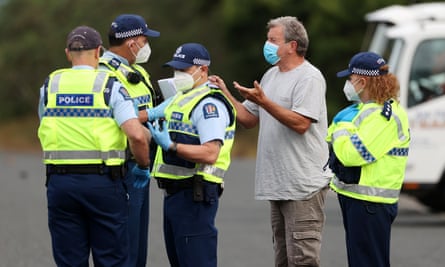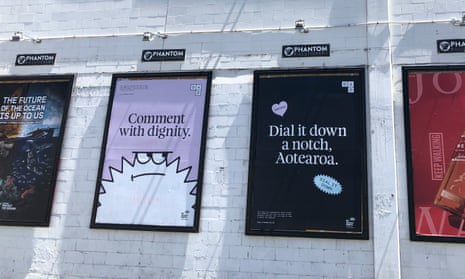Faced with a rising tide of acrimony, rage, and online crankiness, New Zealand has launched a nationwide campaign to try to calm its citizenry down.
Over the summer, pastel posters began cropping up around the cities, asking New Zealanders to “dial it down a notch,” “read it before you hit enter,” and “comment with dignity”. Cartoon characters entreat keyboard warriors to take a breath, and consider “what would your mother say?”
The Human Rights Commission – which is an independent crown entity – launched the campaign late last year. Human rights commissioner Paul Hunt says it was prompted by “a rising tide of division and antisocial behaviour.”
“Complaints and inquiries have gone off the richter scale. People are really stressed and angry,” Hunt says. The commission has had more complaints about abuse in the past seven months than its previous record annual high, he says. The monthly rate of complaints had almost doubled, from 525 to an average of 956.
The “Dial it Down” campaign hoped to remind New Zealanders, Hunt says, that they “can have vigorous disagreement without losing the plot.”
Since mid-2021, there has been a significant rise in the quantity and extremist tone of chatter on social media, says Kate Hannah, a principal investigator at research institute Te Pūnaha Matatini. Researchers were seeing a higher overall volume of violent language and imagery – including increased references to lynchings, sexual violence, misogynistic language and profanity. That tone had become commonplace on mainstream platforms, she says.
“[One] thing that seems really shocking to me is the level of vulgarity. I know that sounds prudish – but I’m not a prude, I’m a kiwi, I swear. We’re not Americans,” she says – referring to a generally higher antipodean tolerance for swearing. “The other thing that’s shocking is [seeing this] from people on Facebook who look like – or they appear to be like – my mum or my aunty, … in their 60s or 70s, using the C-word,” she says. “That is not necessarily something that we’re used to.”
Hunt believes that much of the uptick can be blamed on pandemic stress, and the long, grim months of lockdown.
“Two years of the pandemic is very, very tough. So people are struggling financially, emotionally, mentally, they feel powerless, and they’re struggling to cope. And sometimes people do lash out at something else – or someone else.”

A large current of abuse has flowed toward journalists – who are often the communicators of pandemic policy, infuriating both those who see them as government lackeys or as over-critical of the government’s response.
“The block button has been hot this year,” says Maiki Sherman, chair of the parliamentary press gallery. “I think everyone in the media would agree that we’ve seen an increase in online abuse.”
Some of that abuse was extreme, she says. The protesters gathered outside parliament this week were fond of telling journalists that they would soon be “put on trial” and killed for treason. “Just got told I’m going to be executed by a woman holding a sign saying ‘love is the cure’,” 1 News reporter Kristin Hall remarked on Twitter on Wednesday.
“Reporters have thick skins, we’re used to dealing with confrontation, it’s part of the job. But it’s escalating to a point where there is real concern, given the types of threats that are being made,” Sherman says.
A complicated picture
The increase in abuse, Sherman says, was not exclusively the domain of anti-government or anti-vaccine factions – heated jibes were coming in from across the political spectrum.
“A huge part of it is to do with the pandemic and vaccinations. But I think also in general, there has been a slow growth over the last few years and over the last two decades, with social media growing itself, and so people have more and more been given this tool to have a voice.”
Researchers have found that Māori women were more likely to be subjected to abusive comments – a dynamic Sherman had observed. “I have noticed it targeted at other Māori woman, certainly.”
Accounts of abuse recorded by the commission were not restricted to one side of the vaccination debate. Some complaints, Hunt says, were from people who had mask exemptions due to disability, and were shouted at by members of the public who perceived their lack of a mask as indication of a broader anti-health-regulation stance. Simultaneously, an increasing number of frontline workers tasked with enforcing vaccine passes or masks were subject to abuse from customers who refused to comply.
He speculated whether sharpening rhetoric was driven by some deeper fissures that emerged as the country’s policies have shifted to emphasise greater freedoms for the vaccinated.
“Before, we were all in the same boat. Now, actually, we’re not in the same boat. We’re not being treated the same. Now, I think [the policy] is warranted, I’m not against it – but there is this new dimension … and we’ve got to deal with it properly.”
A publicity campaign would not be sufficient to calm some of the uglier elements of the national conversation, Hunt says, but there was hope it would help.
“Of course, it’s a very complicated picture. We’re not suggesting our campaign is going to solve it – these things are complicated and they require multi dimensional responses. But we thought this campaign had a role to play.”
